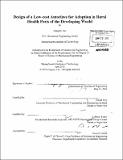Design of a low-cost autoclave for adoption in rural health posts of the developing world
Author(s)
Tao, Gregory Daniel
DownloadFull printable version (8.582Mb)
Other Contributors
Massachusetts Institute of Technology. Dept. of Mechanical Engineering.
Advisor
Daniel Frey and Amos Winter.
Terms of use
Metadata
Show full item recordAbstract
Incidence of surgical site infection is two to five times higher in developing nations as compared to developed nations. Autoclaves kill all dangerous pathogens, including heat-resistant endospores, and are an essential tool to achieving and maintaining a sterile environment, which decreases risk of infection. A low-cost, easy to use autoclave was designed to address the unique technical, behavioral, and market challenges present in rural health posts of the developing world. A thorough stakeholder analysis was performed very early in the design process to address needs for sustained user adoption as well as manufacturability and scalability. Twelve partnering clinics in Nepal trialed these autoclaves from July until December 2012. Usage statistics from this period and follow-up observations highlight important factors for successful adoption. These findings were used to improve the autoclave design in a second iteration.
Description
Thesis (S.M.)--Massachusetts Institute of Technology, Dept. of Mechanical Engineering, 2012. Cataloged from PDF version of thesis. Includes bibliographical references (p. 69-71).
Date issued
2012Department
Massachusetts Institute of Technology. Department of Mechanical EngineeringPublisher
Massachusetts Institute of Technology
Keywords
Mechanical Engineering.